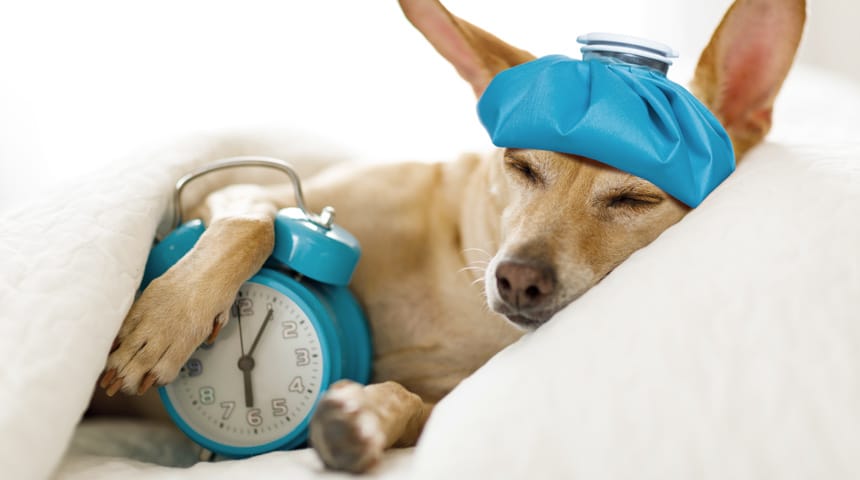As with humans, an emergency with your pet can happen very quickly! But how do you know when a visit to the veterinarian is necessary? Here is a handy little guide to keep that contains all the answers you will need if the situation were to happen.
“Classic” Emergencies
Here is a list of recurring emergencies for which you can start treatment at home, and do not always require a visit to your veterinarian, depending on the case.
- Diarrhea
- Vomiting
- Loss of apetite
- Lameness
- Eye Redness
- Otitis
- Hyper salivation
- Itching
My Pet Has Diarrhea
The first question to ask yourself: could my animal have eaten something unusual such as a toy, a plant, a bone, grass, etc.? If the answer is yes, then a veterinarian must be consulted, since consumption of a foreign body could be the cause.
If the answer is no:
- Give him easily digestible food sold by your veterinarian, or a homemade diet of white rice and cooked ground beef for at least 48 hours.
- You can also add probiotics (sold over the counter) to his food for at least 7 days.
When is it time to consult?
- No improvement after 48 hours
- Blood in stool
- General condition is deteriorating
- Puppy less than 4 months old
My Pet Is Vomiting
Could my pet have eaten anything unusual such as a toy, plant, bone, grass, etc.? If the answer is yes, then a veterinarian must be consulted, since consumption of a foreign body could be the cause.
If the answer is no:
- A complete fast of 8 to 12 hours is recommended.
- If after fasting your animal has not vomited again, you can start introducing small amounts of water.
- If he keeps the water down, you can introduce small amounts of easily digestible food.
- If there is no change, you can go back to normal portions the next day.
Warning: prolonged fasting is not recommended for very small breeds of dogs, puppies, and kittens, as there is a risk of hypoglycemia. If you must fast them, apply corn syrup to their gums every 2 hours.
When to consult?
- No improvement after 48 hours
- Presence of blood
- General condition is deteriorating
- Puppy less than 4 months old
My Pet Isn’t Eating
The first question to ask yourself: is my animal interested in anything other than its food (treats, table food, etc.)?
Before consulting:
- Offer him a “buffet” including 2-3 kinds of kibble, canned food, treats, small pieces of cooked chicken, cooked ground beef and cooked or canned fish.
- Try heating the food to see what he likes best.
- You can try to encourage him to eat by petting him or presenting the food in your hand.
- Try to open its mouth and check if there is anything abnormal (broken tooth, wound, redness, etc.)
When to consult?
If the loss of appetite lasts more than 24-48 hours.
My Pet Limps
Did you see him make a wrong move, fall, hurt his paw? Have you noticed if he has a broken claw?
If so, apply hot and cold alternately and keep the animal at complete rest for at least 24-48 hours.
Caution: Never give Tylenol, Advil, Motrin or Aspirin, as these products are toxic to animals.
When to consult?
- No improvement after 24 hours of complete rest
- Your pet is panting, moaning or showing sharp pain
- You see a wound and there is blood present
My Pet Salivates a Lot
Excessive saliva is called hypersalivation and can be a sign of nausea, mouth injury, toothache, or rabies.
When you notice that your pet is salivating a lot, has he just eaten something that tastes bad (plant, medication, etc.)?
Start by wiping his mouth and offering him some water.
Is his rabies vaccine up to date? Despite the sharp decrease in cases in Quebec, the disease is still present and unvaccinated animals are more at risk.
When to consult?
- Hypersalivation persists for more than one hour
- You notice a mouth sore or a broken tooth
- Your pet refuses to eat
- His rabies vaccine is not up to date
My Pet Has Red Eyes
Any eye problem deserves a visit to your veterinarian without delay.
Caution: Never administer drops purchased from a human pharmacy. Some products can cause severe allergic reactions.
If you have an Elizabethan collar in your home, put it on your pet as soon as possible. It will prevent him from scratching his eyes and making his problem worse.
My Pet Seems to Have An Ear Infection
Does your pet frequently shake his head? Does he constantly scratch his ears?
Start by cleaning his ears once a day for three days with a drying and antibacterial ear cleaner (available over the counter).
When to consult?
- No improvement despite 3 days of treatment.
- You notice blood or sores in his ear.
- Redness intensifies after
- It is a cat
My Pet Scratches A Lot
First step:
- Put an Elizabethan collar on him to prevent further injury.
- Check for fleas or ticks.
- If there are no sores, you can try washing it with a soothing oatmeal shampoo every second day.
When to consult?
- If you notice the presence of sores, pimples, scabs, or patchy hair loss.
- The itching persists despite home care.
If you are unsure about the severity of your pet's symptoms, contact your veterinarian directly. Outside opening hours, you can communicate with one of our teams available 24 hours a day, 7 days a week:
Please note that the advice in this article is provided for guidance only. Nothing beats the diagnosis of a veterinary examination as well as the treatments that will be offered to you.





